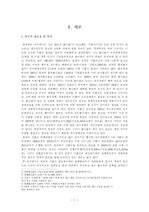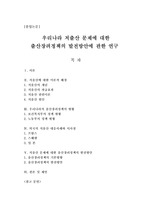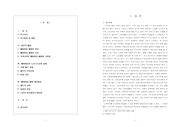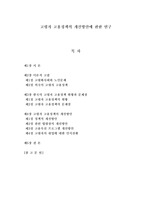

PARTNER
검증된 파트너 제휴사 자료
출산율과 정부간 재정정책 (Balanced Regional Development and Fertility Policy)
한국학술지에서 제공하는 국내 최고 수준의 학술 데이터베이스를 통해 다양한 논문과 학술지 정보를 만나보세요.
34 페이지
최초등록일 2025.03.10
최종저작일
2024.12

-
서지정보
· 발행기관 : 한국재정정책학회
· 수록지 정보 : 재정정책논집 / 26권 / 4호 / 117 ~ 150페이지
· 저자명 : 김현아
초록
본 논문은 2000년 이후 출산율 개선을 위한 다양한 정책과 경제, 재정환경 등이 출산율에 어떠한 영향을 미쳤는가를 시군구 단위 분석을 통하여 살펴보았다.
‘높은 사교육비’, ‘주거비 지출’과 같은 사회구조적 특징들은 출산율과 음의 상관관계를 보여 기존 연구와 일관된 결과를 나타내었다. 반면, ‘공시가격’은 출산율과 양의 상관관계를 보여주고 있어, 출산의 소득 및 자산 양극화 추론이 가능하다. 양육환경과 관련해서 지난 20여년간 ‘모의 경제활동’이나 ‘가구소득’은 출산과 노동시장의 선순환구도를 발견하지 못하였다. 지역간 격차를 반영하는 ‘지방소득세’는 출산율과 음의 상관관계를 보여주었다. 결론적으로, 본 논문은 출산지원의 정부간 재정정책 방향으로 중앙정부는 소득양극화 개선, 일가정 양립가능한노동시장 구조개선, 지역간 격차 완화 부분을 강조하고, 지방자치단체는 인구유출 최소화를 위한 산업기반 확대와 정주환경 개선 부분에 집중할 것을 제안한다.영어초록
This paper examines how the structural characteristics of Korean society have manifested in birth rates, by analyzing data at the level of local governments. It was found that factors such as “high private education costs” and “housing expenditure” have a negative impact on birth rates, even at the city and district level. On the other hand, “public property values” showed a positive correlation with birth rates, suggesting the possibility of income and asset polarization affecting childbirth. In terms of maternal characteristics, it was observed that over the past 20 years, efforts to increase household income—primarily through “maternal economic activity” or “household income”—have had a negative impact on birth rates, indicating that a virtuous cycle between childbirth and the labor market has not yet been established.
The paper suggests that fiscal policies aimed at improving fertility should be divided between the central and local governments. The central government should focus on structural reforms such as income inequality reduction and labor market restructuring, investing in fundamental changes to improve the socio-economic environment for families. Meanwhile, local governments should prioritize autonomous fertility support policies to attract population growth, while also focusing on long-term strategies to expand employment and education infrastructure to prevent population outflow. This dual approach could help address both the immediate and long-term challenges of South Korea’s fertility decline.참고자료
· 없음태그
-
자료후기
-
자주묻는질문의 답변을 확인해 주세요

꼭 알아주세요
-
자료의 정보 및 내용의 진실성에 대하여 해피캠퍼스는 보증하지 않으며, 해당 정보 및 게시물 저작권과 기타 법적 책임은 자료 등록자에게 있습니다.
자료 및 게시물 내용의 불법적 이용, 무단 전재∙배포는 금지되어 있습니다.
저작권침해, 명예훼손 등 분쟁 요소 발견 시 고객센터의 저작권침해 신고센터를 이용해 주시기 바랍니다. -
해피캠퍼스는 구매자와 판매자 모두가 만족하는 서비스가 되도록 노력하고 있으며, 아래의 4가지 자료환불 조건을 꼭 확인해주시기 바랍니다.
파일오류 중복자료 저작권 없음 설명과 실제 내용 불일치 파일의 다운로드가 제대로 되지 않거나 파일형식에 맞는 프로그램으로 정상 작동하지 않는 경우 다른 자료와 70% 이상 내용이 일치하는 경우 (중복임을 확인할 수 있는 근거 필요함) 인터넷의 다른 사이트, 연구기관, 학교, 서적 등의 자료를 도용한 경우 자료의 설명과 실제 자료의 내용이 일치하지 않는 경우
찾으시던 자료가 아닌가요?
지금 보는 자료와 연관되어 있어요!
문서 초안을 생성해주는 EasyAI









